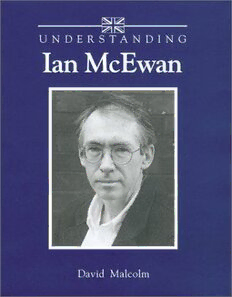
Understanding Ian McEwan (Understanding Contemporary British Literature) PDF
231 Pages·2002·1.134 MB·English
Most books are stored in the elastic cloud where traffic is expensive. For this reason, we have a limit on daily download.
Preview Understanding Ian McEwan (Understanding Contemporary British Literature)
Description:
Understanding Ian McEwan provides a full discussion of the fiction written by one of Britain's most highly regarded novelists and the winner of the 1998 Booker Prize. David Malcolm places Ian McEwan's work—admired by critics for its polished, understated treatment of themes of aberrance and obsession—in the context of British literature's particular dynamism in the last decades of the twentieth century. He also examines McEwan's relationship to feminism, concern with rationalism and science, use of moral perspective, and proclivity toward fragmentation. Malcolm offers close readings of McEwan's early short stories, which he recognizes as traditional and conservative in technique despite their shocking subject matter, and all of McEwan's novels. Employing the third novel, The Child in Time, as the fulcrum for his discussion, Malcolm explores the themes of incest, espionage, moral self-flagellation, sexual fixation, political dysfunction, and personal antipathy evident in the other fiction. He illumines the continuities obscured by the conventional approach to McEwan's fiction and raises the question whether McEwan is a novelist of brilliant fragments or of overall coherence.
See more
The list of books you might like
Most books are stored in the elastic cloud where traffic is expensive. For this reason, we have a limit on daily download.
